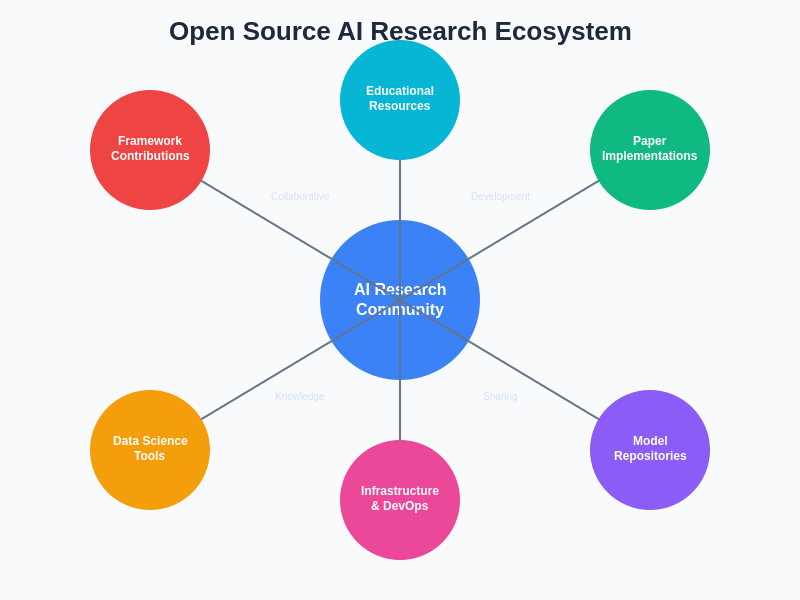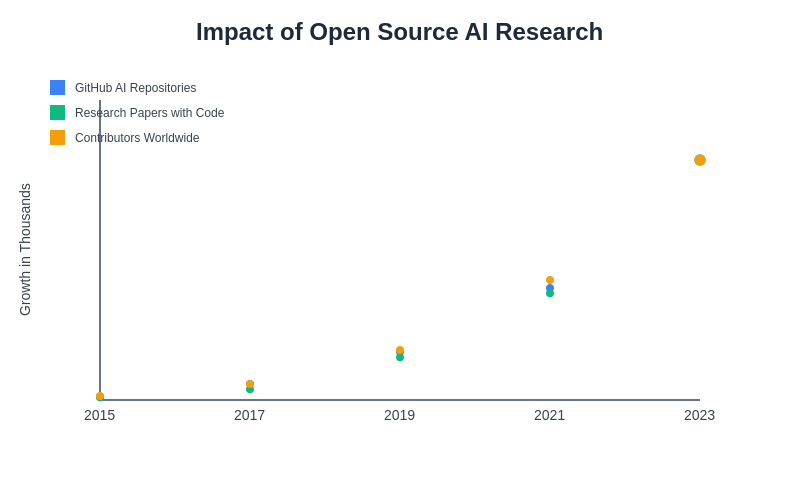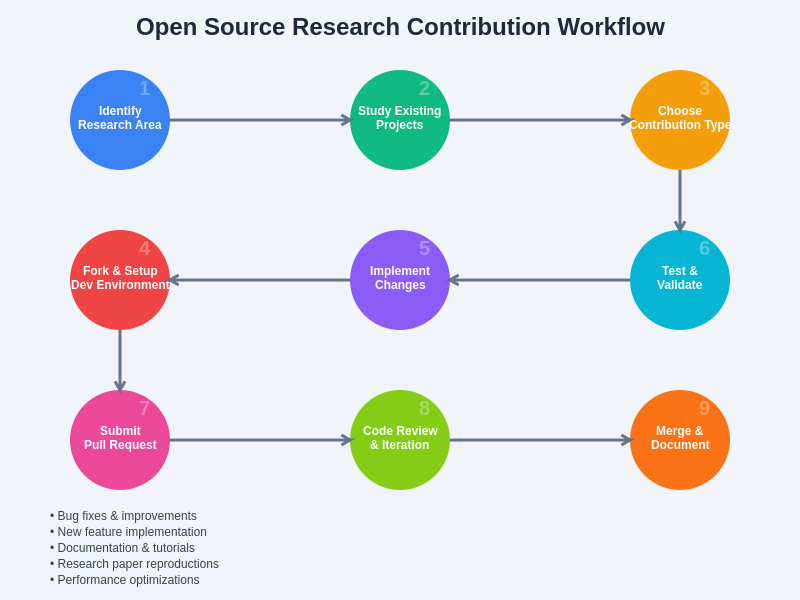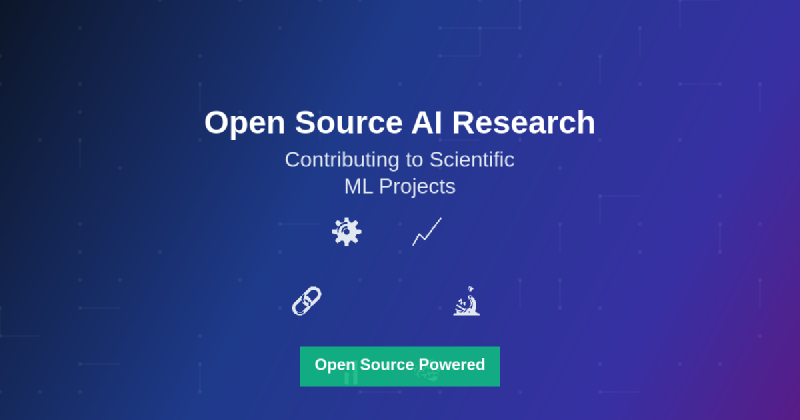The democratization of artificial intelligence research through open source collaboration has fundamentally transformed how scientific breakthroughs are achieved, shared, and implemented across the global research community. This paradigm shift has created unprecedented opportunities for researchers, developers, and enthusiasts to contribute to cutting-edge machine learning projects that push the boundaries of what is possible in artificial intelligence. The collaborative nature of open source AI research has accelerated innovation while ensuring that groundbreaking discoveries remain accessible to the broader scientific community rather than being confined to proprietary research laboratories.
Explore the latest developments in AI research and trends to stay informed about emerging opportunities for contribution and collaboration within the rapidly evolving landscape of open source artificial intelligence projects. The intersection of open science principles with advanced machine learning methodologies has created a fertile environment where individual contributions can have far-reaching impacts on the trajectory of AI development and scientific discovery.
The Foundation of Open Source AI Collaboration
The open source artificial intelligence ecosystem represents a remarkable convergence of academic rigor, industrial innovation, and community-driven development that has redefined how machine learning research is conducted and disseminated. Unlike traditional proprietary research environments where discoveries remain locked within institutional boundaries, open source AI projects create transparent, collaborative spaces where researchers from diverse backgrounds can contribute their expertise, validate findings, and build upon each other’s work to accelerate scientific progress.
This collaborative framework has proven particularly powerful in addressing complex challenges that require interdisciplinary expertise and computational resources that exceed the capabilities of individual research groups. The collective intelligence model inherent in open source development enables researchers to tackle ambitious projects such as large language models, computer vision systems, and reinforcement learning algorithms that would be prohibitively expensive or technically challenging for isolated research efforts. The resulting synergy between contributors creates a multiplier effect that amplifies the impact of individual contributions while fostering innovation through diverse perspectives and approaches.

The interconnected nature of open source AI research creates a dynamic ecosystem where contributions in one area often catalyze innovations across multiple domains. This collaborative network effect ensures that individual efforts contribute to a larger scientific endeavor that benefits the entire research community.
Major Open Source AI Research Platforms
The landscape of open source AI research is dominated by several major platforms and frameworks that serve as the foundation for countless scientific machine learning projects. TensorFlow, developed by Google Research, has emerged as one of the most influential open source machine learning libraries, providing researchers with comprehensive tools for building, training, and deploying sophisticated AI models across diverse domains ranging from natural language processing to computer vision and reinforcement learning.
PyTorch, originally developed by Meta’s AI Research lab, has gained tremendous traction within the research community due to its dynamic computation graph and intuitive Python-based interface that facilitates rapid prototyping and experimentation. The framework’s emphasis on flexibility and ease of use has made it particularly popular among academic researchers who value the ability to implement novel architectures and algorithms without being constrained by rigid framework limitations. The ongoing development of PyTorch involves contributions from hundreds of researchers worldwide, each adding capabilities that advance the state of the art in machine learning research.
Experience advanced AI capabilities with Claude to enhance your understanding of complex machine learning concepts and contribute more effectively to open source research initiatives. The integration of AI-powered tools into the research workflow has become increasingly valuable for analyzing literature, generating code, and exploring novel approaches to challenging problems in artificial intelligence.
Contributing to Machine Learning Frameworks
Contributing to major machine learning frameworks requires a deep understanding of both the theoretical foundations of artificial intelligence and the practical considerations involved in building scalable, efficient software systems. Successful contributions typically begin with identifying specific areas where improvements can be made, whether through performance optimizations, bug fixes, feature enhancements, or documentation improvements that make the frameworks more accessible to new contributors and users.
The process of contributing to established frameworks like TensorFlow or PyTorch involves navigating complex codebases that have been developed over many years by hundreds of contributors. This requires not only technical proficiency in programming languages such as Python, C++, and CUDA, but also an understanding of software engineering best practices including version control, testing methodologies, and code review processes. Successful contributors often begin with smaller, well-defined issues before gradually taking on more complex challenges that require deeper understanding of the framework’s architecture and design principles.
The impact of framework contributions extends far beyond the immediate technical improvements, as these enhancements become available to the entire global community of machine learning researchers and practitioners. A single optimization to a core computation routine can potentially accelerate thousands of research projects worldwide, while improvements to documentation and tutorials can lower barriers to entry for new researchers seeking to contribute to the field of artificial intelligence.
Research Paper Implementations and Reproducibility
One of the most valuable contributions to the open source AI research community involves implementing and reproducing results from recent scientific publications. This process, known as reproducible research, serves multiple critical functions within the scientific method while providing opportunities for contributors to deepen their understanding of cutting-edge techniques and methodologies. The implementation of paper results requires careful attention to detail, thorough understanding of the underlying algorithms, and the ability to translate mathematical formulations into efficient, working code.
The challenge of reproducibility in machine learning research has become increasingly important as the field has grown more complex and computationally intensive. Many research papers present novel algorithms and architectures but may lack sufficient implementation details or may rely on proprietary datasets and computational resources that are not readily available to the broader research community. Open source implementations help bridge this gap by providing verified, working code that other researchers can use as a foundation for their own work.
The process of reproducing research results often reveals important insights that were not apparent in the original publication, including implementation details that significantly impact performance, sensitivity to hyperparameters, and computational requirements that may not have been fully documented. These discoveries contribute valuable knowledge to the research community while helping to establish best practices for experimental methodology and result reporting in machine learning research.

The exponential growth of open source AI research demonstrates the transformative power of collaborative scientific development. The increasing number of repositories, research implementations, and global contributors reflects the democratization of AI research and the acceleration of scientific progress through open collaboration.
Scientific Computing and Specialized Libraries
Beyond the major machine learning frameworks, the open source AI ecosystem includes numerous specialized libraries and tools that address specific domains within artificial intelligence research. Libraries such as scikit-learn provide comprehensive implementations of classical machine learning algorithms with emphasis on ease of use and educational value, making them ideal platforms for contributors interested in improving algorithm implementations or adding support for new methodologies.
Computer vision research benefits from libraries like OpenCV and specialized deep learning frameworks such as Detectron2 and MMDetection, which provide state-of-the-art implementations of object detection, semantic segmentation, and image analysis algorithms. Contributing to these specialized libraries often requires domain-specific expertise in areas such as image processing, geometric transformations, and optimization techniques tailored to visual data analysis.
Natural language processing research is supported by libraries such as spaCy, NLTK, and the Transformers library from Hugging Face, each addressing different aspects of language understanding and generation. These platforms provide opportunities for contributors to work on cutting-edge problems in machine translation, text summarization, question answering, and dialogue systems while building tools that benefit the broader research community working on language-related AI challenges.
Discover comprehensive research capabilities with Perplexity to enhance your literature review process and identify promising areas for contribution within the vast landscape of open source AI research projects. The ability to efficiently navigate and synthesize research literature is crucial for identifying impactful contribution opportunities and understanding the current state of the art in rapidly evolving fields.
Data Science and Analysis Tools
The foundation of artificial intelligence research rests upon robust data science tools that enable researchers to collect, process, analyze, and visualize the complex datasets that drive machine learning innovations. Open source data science libraries such as pandas, NumPy, and matplotlib provide essential infrastructure for data manipulation and analysis, while libraries like Jupyter notebooks create interactive environments that facilitate exploratory data analysis and collaborative research.
Contributing to data science tools often involves improving performance for large-scale datasets, adding support for new data formats and sources, or developing visualization capabilities that help researchers better understand complex patterns within their data. These contributions may seem less glamorous than developing novel AI algorithms, but they provide essential infrastructure that enables countless research projects and often have broad impact across multiple domains of scientific inquiry.
The integration of big data technologies with machine learning workflows has created opportunities for contributions that bridge the gap between traditional data processing systems and modern AI frameworks. Projects that improve the efficiency of data pipeline construction, enable distributed training across multiple machines, or facilitate the management of large-scale datasets make important contributions to the research infrastructure that supports advanced AI development.
Model Repositories and Sharing Platforms
The emergence of model sharing platforms such as Hugging Face Hub, TensorFlow Hub, and PyTorch Hub has revolutionized how researchers share pre-trained models and collaborate on complex AI projects. These platforms enable researchers to build upon each other’s work by providing access to state-of-the-art models that can be fine-tuned for specific applications or used as components within larger systems.
Contributing to model repositories involves not only sharing trained models but also providing comprehensive documentation, usage examples, and performance benchmarks that help other researchers understand when and how to effectively utilize these resources. The quality of model documentation and accompanying materials often determines the impact and adoption of shared models within the research community.
The process of curating high-quality model repositories requires attention to reproducibility, versioning, and metadata management that ensures models remain usable and valuable over time. Contributors who focus on improving the infrastructure and standards for model sharing make important contributions to the sustainability and accessibility of AI research resources.
Research Collaboration and Community Building
Successful open source AI research projects depend not only on technical contributions but also on the development of vibrant, inclusive communities that support collaboration and knowledge sharing among contributors with diverse backgrounds and expertise levels. Community building efforts include organizing workshops and conferences, maintaining communication channels, developing mentorship programs, and creating documentation that makes projects accessible to new contributors.
The challenge of building sustainable research communities involves balancing the need for technical rigor with inclusivity and accessibility for researchers from different backgrounds and career stages. Effective community management requires establishing clear contribution guidelines, maintaining respectful communication norms, and providing support structures that help new contributors navigate complex technical projects while making meaningful contributions.
The global nature of open source AI research creates opportunities for collaboration across traditional institutional and geographical boundaries, but also presents challenges related to time zone differences, language barriers, and varying levels of access to computational resources. Successful projects develop strategies for managing distributed collaboration while ensuring that all contributors have opportunities to participate meaningfully in the research process.
Technical Infrastructure and DevOps
The computational demands of modern AI research require sophisticated technical infrastructure that can support large-scale model training, distributed computing, and efficient resource utilization. Contributing to the infrastructure aspects of open source AI projects involves working on continuous integration systems, automated testing frameworks, deployment pipelines, and monitoring systems that ensure research code remains reliable and reproducible across different computing environments.
DevOps contributions to AI research projects often focus on improving the efficiency of experiment management, enabling reproducible research workflows, and reducing the technical barriers that prevent researchers from effectively utilizing computational resources. These contributions may involve developing tools for hyperparameter optimization, experiment tracking, and result visualization that help researchers manage the complexity of large-scale machine learning experiments.
The integration of cloud computing resources with open source AI frameworks has created new opportunities for infrastructure contributions that enable researchers to access powerful computing resources without requiring substantial institutional investment in hardware. Projects that improve the accessibility and efficiency of cloud-based AI research infrastructure make important contributions to democratizing access to advanced computational resources.
Educational Resources and Documentation
The accessibility of open source AI research depends critically on high-quality educational resources and documentation that help new contributors understand complex technical concepts and contribute effectively to research projects. Educational contributions include developing tutorials, creating example projects, writing comprehensive documentation, and producing video content that explains difficult concepts in accessible ways.
The challenge of creating effective educational resources for AI research lies in bridging the gap between theoretical knowledge and practical implementation skills while accommodating learners with diverse backgrounds and learning styles. Successful educational contributions often combine rigorous technical content with hands-on examples that allow learners to experiment with concepts and build practical skills through direct engagement with research tools and methodologies.
The impact of educational contributions extends far beyond individual learning outcomes, as improved documentation and tutorials can significantly accelerate the onboarding process for new contributors while reducing the support burden on experienced project maintainers. These contributions help ensure the long-term sustainability of open source research projects by facilitating knowledge transfer and community growth.
Ethical AI and Responsible Research Practices
The growing awareness of ethical considerations in artificial intelligence research has created important opportunities for contributions that address bias, fairness, transparency, and accountability in machine learning systems. Open source projects focused on ethical AI provide platforms for developing tools and methodologies that help researchers identify and mitigate potential harms associated with AI systems while promoting responsible research practices.
Contributing to ethical AI research involves not only technical work on bias detection and mitigation algorithms but also participation in broader discussions about research ethics, data privacy, and the societal implications of AI technologies. These contributions often require interdisciplinary collaboration with experts in fields such as philosophy, sociology, and law to ensure that technical solutions address real-world ethical challenges.
The development of ethical AI tools and practices within open source communities helps establish standards and norms that can influence the broader AI research ecosystem. Contributors working in this area play crucial roles in shaping how the research community approaches questions of responsibility and accountability in AI development.

The structured workflow for contributing to open source AI research projects provides a systematic approach that ensures quality contributions while fostering collaboration and knowledge sharing. This process enables researchers at all levels to make meaningful contributions to advancing the field of artificial intelligence through open science principles.
Future Directions and Emerging Opportunities
The rapidly evolving landscape of artificial intelligence research continues to create new opportunities for open source contributions across diverse domains and applications. Emerging areas such as quantum machine learning, neuromorphic computing, and AI-powered scientific discovery represent frontier research areas where early contributions can have significant impact on the trajectory of future development.
The integration of AI with other scientific disciplines creates opportunities for contributors with expertise in fields such as biology, chemistry, physics, and materials science to apply machine learning techniques to domain-specific challenges while contributing to the development of specialized tools and methodologies. These interdisciplinary contributions often lead to breakthrough discoveries that advance both AI research and domain-specific scientific knowledge.
The continued democratization of AI research through open source collaboration promises to accelerate innovation while ensuring that the benefits of artificial intelligence remain accessible to researchers and practitioners worldwide. Future contributors to open source AI research will play crucial roles in shaping how these powerful technologies are developed, deployed, and governed in ways that benefit humanity while advancing scientific understanding.
The evolution of open source AI research represents a remarkable example of how collaborative, transparent approaches to scientific inquiry can accelerate innovation while fostering inclusive communities that welcome contributions from diverse perspectives and backgrounds. As the field continues to evolve, the opportunities for meaningful contribution will only grow, creating pathways for researchers at all career stages to participate in advancing the frontiers of artificial intelligence while building tools and knowledge that benefit the global research community.
Disclaimer
This article provides general information about contributing to open source AI research projects and should not be considered as specific guidance for any particular research initiative or career decision. The landscape of AI research evolves rapidly, and contributors should conduct their own research to identify current opportunities and requirements. The effectiveness of different contribution strategies may vary depending on individual skills, interests, and career objectives. Readers are encouraged to engage directly with project communities and maintainers to understand specific contribution guidelines and expectations.
